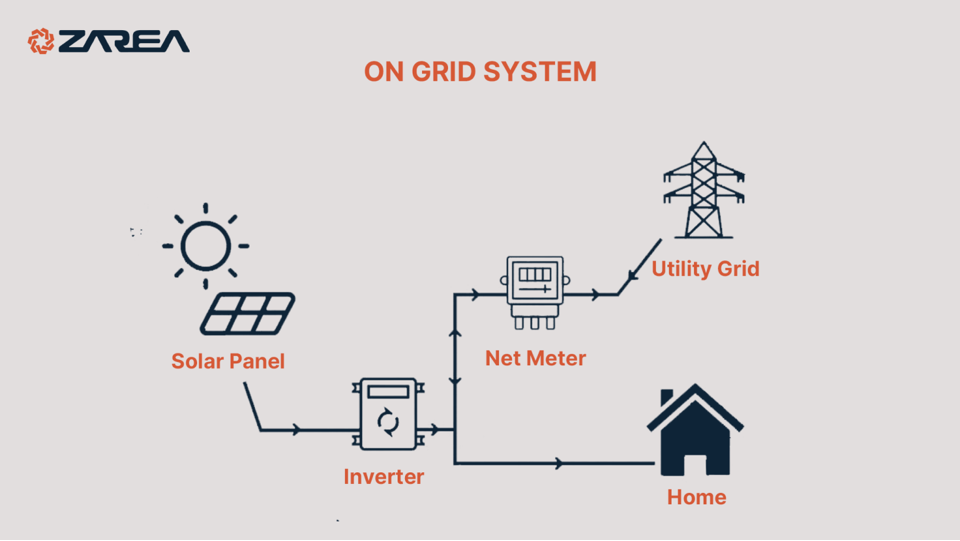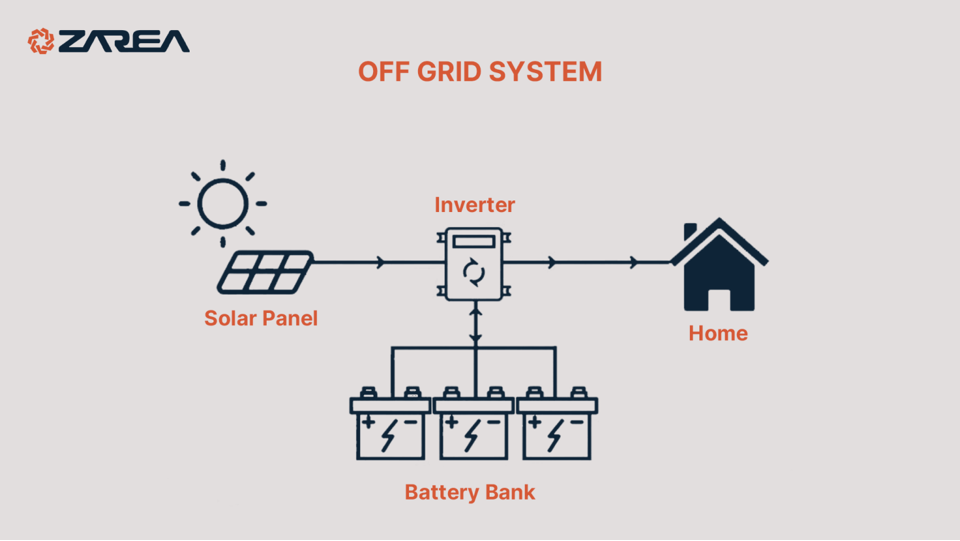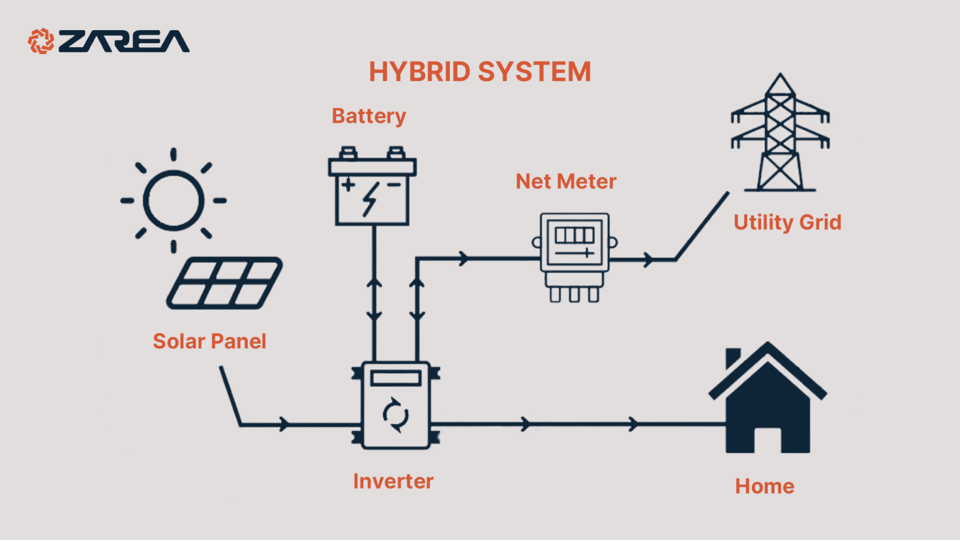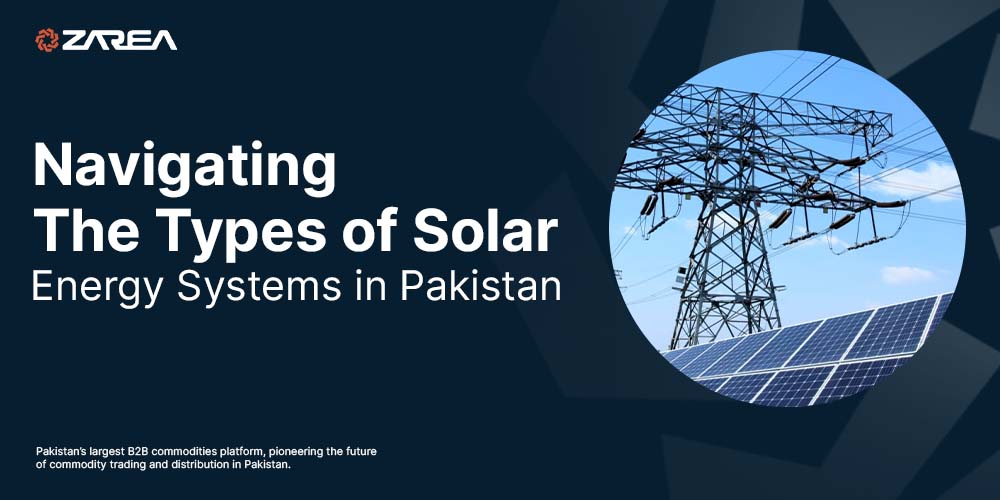Solar power systems are revolutionizing the power and energy sector on multiple fronts. Today we will discuss different types of solar energy system in Pakistan. The whole setup of solar power systems comprises components responsible for producing electrical current through solar energy. Solar power systems are the talk of the town since they promote renewable energy generation that has a significantly positive impact on the environment and Pakistan’s economy. Zarea Limited is the one-stop shop for all your solar energy products. We have all the equipment required to set up a solar energy system in Pakistan.
Nuances of the Solar Power System in Pakistan
Solar power systems are the way forward in sustainability and green power generation. A solar power system is an arrangement of equipment that transforms the sunlight into usable electrical current through solar panels. The photovoltaic cells embedded in the solar panels are responsible for harnessing the sunlight and generating direct current (DC) that is converted into alternating current (AC) through solar inverters.
Components of Solar Energy Systems
Typically, a solar energy system comprises solar panels, solar inverters, batteries, and an electric switchboard. The components usually depend on the type of solar energy systems and their connection to the electrical grid.
- Solar Panels: Solar panels are composed of photovoltaic (PV) cells that generate electrical current when solar energy hits the panels through the photovoltaic effect. The energy generation of the panel depends on the angle of the solar panels, the efficiency rate of the panel, and solar irradiance in the area.
- Solar Inverters: Solar cells generate direct current (DC) that has to be converted into alternating current (AC) to be used commercially and domestically. The solar inverters play a vital role in the transformation of direct current into alternating current. A string inverter system comprises of series of solar panels connected feeding the direct current into the inverter to be converted into alternating current. Whereas, the micro-inverter system comprises in-built micro-inverters attached to the rear ends of the solar panels. The DC power is converted into AC power through these micro-inverters and fed to the electrical switchboard.
- Batteries: Modern solar energy systems contain an energy storage option that can be consumed after sunset as well. For that, lithium-ion and lead-acid batteries are used eminently. These rechargeable energy storage batteries are available in all shapes, sizes, and capacities at Zarea’s Website. Check out today for a hassle-free solar energy installation tailored for your home and business.
- Electrical Switchboard: In a standard grid-tied or on-grid solar energy system, the alternating current coming from the solar inverters is sent to the switchboard which is then used to power the appliances and circuits. Whereas, the excess of this usable current generated by the solar power systems can be sent to the electricity grid through the energy meter. This phenomenon is called net metering. On the other hand, if you have installed a hybrid solar energy system, the excessive current can be stored in batteries.
Now that we have covered the components needed for the installation of the solar energy system, let us dive into the different types of solar energy systems in Pakistan facilitating the solar energy development across the country.
Types of Solar Energy Systems
The types of solar energy systems in Pakistan depends on the connection to the electrical grid and energy storage systems.
-
On-grid or Grid-tied Solar System
The on-grid or grid-tied solar energy system is connected to the national electricity grid. It is grid-dependent therefore if the grid’s power goes down the solar system also goes down. Therefore, the on-grid solar system only generates electricity when the power grid is available. This type of solar energy system permits bidirectional power flow and is economical.

The on-grid solar system comprises of solar panels, solar inverters, a net meter, and a connection to the electricity grid. The electricity grid acts as a remote battery therefore; the on-grid solar system does not include a battery storage system of its own.
-
Off-grid Solar System
The off-grid or stand-alone power system (SAPS) is the type of solar energy system that is independent of the utility grid which makes it an ideal option to deliver power to remote places. These systems can solely operate in sunlight anywhere without any hassle. These solar energy systems generate electricity that can be stored through battery storage systems. Moreover, when the weather is not ideal, a backup generator is required as a backup power source to run the system.

-
Hybrid Solar System
A hybrid solar energy system is grid-tied and also has a battery storage system. The integration of on-grid and off-grid solar energy systems makes it a versatile option for energy generation. The solar panels generate power that can be either stored or exported to the utility grid immediately. This system can operate independently of the utility grid as well therefore the electricity outage does not affect its performance.

Conclusion
Solar energy systems in Pakistan can be the most fundamental and sustainable investment for people and businesses. Solar energy supplies an inexhaustible amount of low-cost electricity if taken into account. Solar energy development companies are expanding their operations and efficiency of solar energy products to provide users with unlimited power through renewable sources. Zarea Limited promises sustainability and innovation therefore we promote solar energy systems in Pakistan to make the country greener and energy-independent! Check out our website to buy the most affordable and energy-efficient solar energy products tailored to your needs and energy requirements.

































